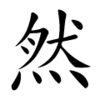然
Translingual
| Stroke order | |||
|---|---|---|---|

| |||
| Stroke order | |||
|---|---|---|---|

| |||
Han character
然 (Kangxi radical 86, 火+8, 12 strokes, cangjie input 月大火 (BKF), four-corner 23333, composition ⿱肰灬)
Derived characters
References
- Kangxi Dictionary: page 675, character 12
- Dai Kanwa Jiten: character 19149
- Dae Jaweon: page 1086, character 20
- Hanyu Da Zidian (first edition): volume 3, page 2213, character 5
- Unihan data for U+7136
Chinese
| trad. | 然 | |
|---|---|---|
| simp. # | 然 | |
| alternative forms | 𤉷 ⿱犬一 (second-round simplified) | |
Glyph origin
| Historical forms of the character 然 | ||
|---|---|---|
| Warring States | Shuowen Jiezi (compiled in Han) | Liushutong (compiled in Ming) |
| Bronze inscriptions | Small seal script | Transcribed ancient scripts |

|

|

|
Phono-semantic compound (形聲/形声, OC *njen) : phonetic 肰 (OC *njen, “dog meat”) + semantic 火 (“fire”) – to burn. Also ideogrammic compound (會意/会意) . The derivative 燃 (OC *njen) stands for the original word in Modern Chinese.
Note that the upper left component is analyzed as 肉 (meat), and in the component 肰 it is drawn as a tilted 月 (“moon”), appearing more like 夕 (“evening”) with an extra stroke; compare 祭, 將.
Pronunciation
Lua error in Module:wuu-pron at line 157: Incorrect tone notation "3" for sh. See WT:AZH/Wu.
Definitions
- † so; thus; in this manner; like this
- † Suffix forming adverbs, sometimes also adjectives, with an abstract meaning of “in the manner of, like”.
- † but
- 然而 ― rán'ér ― but
Compounds
Lua error in Module:zh/templates at line 32: This template has been deprecated. Please use Template:col3 instead.
Japanese
Kanji
- suffix after nouns to express likeness
- and; and then
- so, be as it is
- and therefore
- however (as shikashi)
- a certain thing
Readings
- Go-on: ねん (nen, Jōyō)
- Kan-on: ぜん (zen, Jōyō)
- Kun: もえる (moeru, 然える); しかれども (shikaredomo, 然れども); しかして (shikashite, 然して)
Compounds
Etymology
| Kanji in this term |
|---|
| 然 |
| ぜん Grade: 4 |
| on’yomi |
From (deprecated template usage) [etyl] Middle Chinese 然 (nyen, “-like”).
Pronunciation
Lua error in Module:ja-pron at line 78: Parameter "yomi" is not used by this template.
Suffix
- Indicates a state (no specific semantic content)
References
- Halpern, Jack: New Japanese-English Character Dictionary -Kenkyusha 1990
Korean
Hanja
然 • (yeon) (hangeul 연, revised yeon, McCune–Reischauer yŏn, Yale yen)
- This term needs a translation to English. Please help out and add a translation, then remove the text
{{rfdef}}.
Vietnamese
Han character
(deprecated template usage) 然 (nhiên)
- This term needs a translation to English. Please help out and add a translation, then remove the text
{{rfdef}}.
- Translingual lemmas
- Translingual symbols
- Han script characters
- Han phono-semantic compounds
- Han ideogrammic compounds
- Chinese lemmas
- Chinese Han characters
- Chinese terms with obsolete senses
- Mandarin terms with usage examples
- Literary Chinese terms with usage examples
- Japanese Han characters
- Grade 4 kanji
- Japanese kanji with goon reading ねん
- Japanese kanji with kan'on reading ぜん
- Japanese kanji with kun reading も-える
- Japanese kanji with kun reading しか-れども
- Japanese kanji with kun reading しか-して
- Japanese terms spelled with 然 read as ぜん
- Japanese terms read with on'yomi
- Japanese terms derived from Middle Chinese
- Japanese lemmas
- Japanese suffixes
- Japanese terms spelled with fourth grade kanji
- Japanese terms written with one Han script character
- Japanese terms spelled with 然
- Japanese single-kanji terms
- Korean lemmas
- Korean Han characters
- Vietnamese lemmas
- Vietnamese Han characters